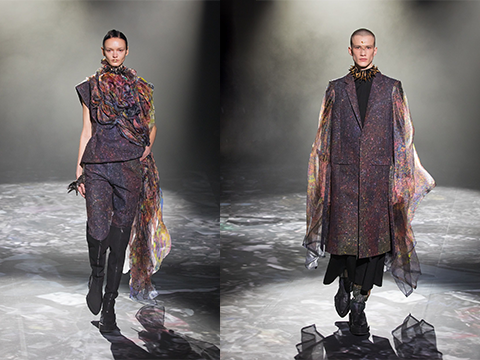
Epson has partnered with renowned Japanese fashion designer Yuima Nakazato and his brand at Paris Haute Couture Fashion Week Spring – Summer 2023 to unveil stunning and sustainable creations, produced with Epson’s dry fibre technology.
The new fabric production process was revealed in Paris as part of a three-year collaboration between Epson and Nakazato and was used in the creation of items for the first time recently during the latter’s runway show at the Palais de Tokyo.
In addition to utilising Epson’s digital textile printing to reproduce his unique and creative worldview, Nakazato made some of his creations with the help of a new, more sustainable and potentially industry-transforming textile production process.
Epson’s dry fibre technology, which is already used commercially to recycle office paper and which requires virtually no water, has been adapted to produce printable non-woven fabric from used garments.
Hitoshi Igarashi from Epson’s Printing Solutions Division explained the importance of the technology, saying, “Although in its early stages, Epson believes its dry fibre technology combined with pigment ink digital printing could offer the fashion industry a much more sustainable future, significantly reducing water use while allowing designers the freedom to fully express their creativity.
“Epson’s Environmental Vision is committed to contributing to a circular economy, and this development could be one step towards achieving this. Dry fibre technology applied to the fashion industry offers the possibility of producing material for new clothes that have been recycled from used garments.”
The collaboration between Epson and Nakazato builds on the success of the company’s printing support for his couture and evolves the level of his creations to enable the low-impact production of high-quality custom garments.
Both Epson and Nakazato are keen to raise awareness of the water and material waste associated with excess production. The Paris Show illustrated how switching to digital textile printing using more environmentally friendly pigment inks offers the fashion industry a more sustainable and less wasteful means of textile printing. Digital textile printing using pigment inks offers a far more sustainable approach to the fabric production process. compared with traditional analogue methods.
The fabric taken to create the latest Nakazato fashion line was derived from material from used garments sourced from Africa, the destination for many discarded garments from elsewhere in the world.
Nakazato visited Kenya where he collected around 150kg of waste garment material destined for the “clothes mountain” of discarded textiles he encountered there. Epson then applied its dry fibre process to produce over 50m of new re-fibreised non-woven fabric, some of which was used for printing with pigment inks with Epson’s Monna Lisa digital printing technology.
Epson’s Monna Lisa digital Direct-to-Fabric printers use less water compared with analogue methods. Pigment inks are more eco-friendly and Epson GENESTA pigment inks are GOTS approved by ECOCERT.
In a trial of distributed printing for venue decoration, Epson inkjet printers in Japan and France with remote support from Epson engineers were used to create decorations in the venue space. Both Epson and Nakazato intend to continue exploring the possibilities for contributing to a more sustainable fashion industry.
Comment below to have your say on this story.
If you have a news story or tip-off, get in touch at editorial@sprinter.com.au.
Sign up to the Sprinter newsletter
